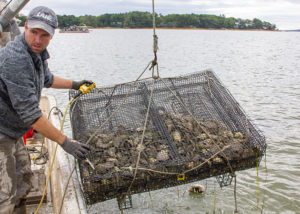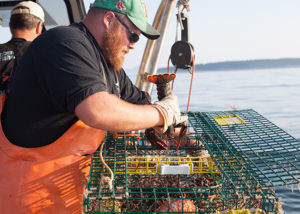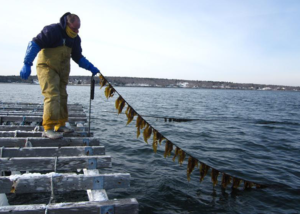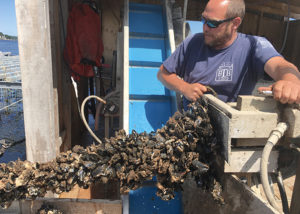Imagine what Maine’s economy could be if our wild-caught fisheries, aquaculture businesses, fishermen, and sea-farmers were granted opportunities to diversify their businesses and put more seafood on plates in Maine, the U.S., and across the globe.
Partnering for Sustainability
At the onset of the pandemic, Maine’s fishermen and coastal communities were challenged in unprecedented ways. With diminished demand for Maine’s seafood placing Maine’s marine economy at risk, the Island Institute and Luke’s Lobster formed a creative partnership and are leveraging more than $2.5 million in shared financial resources to build new markets for the Gulf of Maine specialty seafood products that will drive long-term economic activity in our coastal communities.
This partnership is building resilience in the seafood supply chain and providing new opportunities for Maine’s fishermen and aquaculturists. The project is expanding markets and product offerings through Luke’s online platform and will return financial, social, and environmental benefits to Maine’s coastal communities.
Building on this partnership, Island Institute and Luke’s worked together to commission a report assessing the greenhouse gas emissions related to the production and sale of two of Luke’s primary seafood products, lobster and crab. Released in September 2022, the study showed that lobster has a relatively low carbon footprint compared with other animal protein—2.89 lbs of greenhouse gas emissions for every pound of lobster sourced from Luke’s Lobster. Read more about this report, its findings, and the opportunities it has helped uncover on our blog.
“Without the support of Island Institute we likely would not have a story to tell.”
LUKE HOLDEN
Founder and CEO of Luke’s Lobster
By sharing the story of our unique partnership, both the Island Institute and Luke’s Lobster aim to “lift all boats” through an increased demand for sustainable Maine seafood. The biggest challenge ahead is reducing barriers to cooking Maine seafood at home, with everyday people learning that lobster, monkfish, kelp, and other Maine products are easy to prepare and good for you.
How you can help:
- Read our blog and dive into the full report Island Institute commissioned with Luke’s Lobster which found lobster has a low carbon footprint compared with other proteins.
- Listen to our new podcast series featuring Luke’s Lobster and the Maine fishermen and women who bring sustainable seafood to your plate.
- Check out our favorite Maine chefs preparing their easy recipes in our “Let’s Talk: Maine Seafood” webinar.
- Sign up to receive our emails and monthly newsletter, where we’ll share updates on this work, recipes, and special offers from our working waterfront partners and our friends at Luke’s Lobster.
- Shop online at our store, Archipelago, for the latest seafood-themed products and accessories as well as our collection of seafood cookbooks to help you get started in the kitchen.
- Eat more sustainable Maine seafood. Explore local sources for seafood near you, or check out the Luke’s Lobster online platform here.
Diversification through Aquaculture
Island Institute supports sustainable aquaculture. It is an important component of a resilient blue economy in Maine. We support aquaculture that reflects the interests of local communities, adds value to our coastal economies, and does not degrade Maine’s coastal waters. Aquaculture can provide fishermen and their families a way to continue making a living from the water for years to come and provide additional income beyond the lobster season.
Our approach to aquaculture started with practical business development focused on responsibly growing a nascent shellfish and seaweed aquaculture industry and bolstering Maine’s potential for long-term success through quality education and leadership, research initiatives, and widely sharing the results of these efforts. From 2016-2020, the Island Institute’s Aquaculture Business Development program provided comprehensive support that allowed men and women from rural fishing communities to effectively start and grow new shellfish or seaweed aquaculture businesses. Throughout its four years, the program attracted 100 participants, supported 141 individuals interested in aquaculture, and helped launch 34 new businesses within the aquaculture industry. We estimate that these businesses have contributed over $4.1 million to Maine’s economy. Moving forward, we will focus our aquaculture-related work on supporting those businesses we have already helped get in the water. Additionally, our support will include education, leadership, and workforce development through ongoing outreach and financial support to existing and new aquaculturists.
While sustainable aquaculture provides many benefits to our local economies and working waterfront communities, it is also takes into consideration the impact on our coastal waters and environment. The Island Institute is not supportive of a recent proposal by American Aquafarms for a finfish aquaculture project on Frenchman Bay in Gouldsboro, Maine, due to the scale of inputs, such as fish feed and chemicals for managing parasites, that need to be added to the pens and therefore the environment to ensure farm production. Read our submitted testimony here.
Explore more on sustainable aquaculture:
- Check out our Compass Workforce Grants to help you start on your way to a new adventure in aquaculture.
- Show your support for Maine aquaculture with your very own “Kelp is the New Kale” or “Proud Mothah Shuckah” T-shirts and products—available in our store, Archipelago.
- Watch this video to learn more about how and why we began working in aquaculture here.
Sustainable Seafood Market Analyses
Our efforts to promote sustainable Maine seafood and encourage the growth of aquaculture businesses are based on the knowledge and strategies gained from several initiatives that continue inform our work in sustainable seafood practices.
Edible Seaweed Product Development Study
While the supply of edible seaweed in Maine is on the rise, Americans still know little about how it can be prepared, its health benefits, and its taste. As a result, there are few commercial processors of edible seaweed in the U.S., and therefore, few outlets for new seaweed growers to sell their product.
To help address this problem, the Island Institute, with the help of culinary consultant Jim Griffin, published a product study in September 2017 that assessed the potential of this growing industry in Maine and developed and assessed ten food products which included Maine seaweed as a key ingredient. The products range from a granola bar to baked beans, with the unifying theme being that each recipe is scalable, appropriate for sale at both foodservice and grocery retail, and are considered delicious by the average American consumer. Download a copy of the summary report here.
Maine Farmed Shellfish Market Analysis
Compared to seaweed, the market for Maine shellfish is relatively developed, questions still exist as to how much more supply Maine farmers can generate before demand is exceeded.
To answer some of these questions, in 2015, the Gulf of Maine Research Institute commissioned a report exploring expected trends in demand for Maine shellfish (oysters, mussels, and scallops) over the next 15 years, as well as discussing strategies to maximize profit during this time.
Island Institute staff sat on the advisory board for the project, and in October of 2016, final report was released, with encouraging results for Maine aquaculture. See the final report here.





